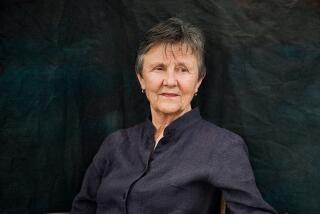BOOK REVIEW : ‘Three Graces’ Get Skewered on a Dull Needle
The Three Graces by Elizabeth Wix (Soho: $19.95; 276 pages)
“The Three Graces” starts off with a certain dash as Elinor and Simon, two bright and beautiful young things at Oxford, exchange catwimp talk about Elinor’s dewy younger sister, Clare. (“Catwimp”: a mixture of camp and a kind of scrambled wit.)
Perhaps we are in for a fresh example in the line of English novelists--Firbank, Waugh, Weldon, for example--who thread comedy through sharp and lethal needles. Clare turns up with dreams of painting, living life, and losing a little weight; Max turns up, brainy, unhinged and dressed in black; and so does Conrad, Max’s good-natured sidekick and a lord’s son.
Puppet theater, we expect; and settle in to enjoy it. No such luck. The puppets are rag dolls. The needle is a stout knitting needle; the thread is domestic wool. The catwimp turns into faint sentimental comedy.
Elinor is meant to be one of the three Graces of the title, taken from a Botticelli painting, but soon she is trundled off; trundling back now and then to provide support, like a stage chair. There are only two Graces, in fact--Clare and her younger schoolmate, Antonia--and as the story wears on, they tend to merge. Clare is on the plump side; Antonia on the thin.
Elinor is not the only character who appears and disappears. All of them, except the two Graces, do: Simon, Max, Conrad, the Graces’ parents, and the friends and lovers to come. Elizabeth Wix has written an adjectival novel. She seems to bring on characters for the sake of being able to describe them. This is less interesting than an adverbial novel, where characters more or less describe themselves by what they do or say or think or suffer.
Clare is from a comfortable suburban family where the mother converses vaguely while focusing upon the roast lamb for supper. The father arrives by train from the city, his Times folded neatly and the crossword puzzle done in ink; and fetches a bottle of claret from the cellar to go with the lamb. These and other pieces are snapped neatly into place; the book tends to have the same relation to a novel that a jigsaw puzzle has to its Constable landscape.
Antonia’s pieces are less kindly. Her father, a glamorous international businessman, married his secretary after his first wife died of chagrin. Eileen has nothing to do all day but shop, fiddle with her makeup and clean up after her poodle, Mimi. Antonia snubs her and fondles the poodle. “Eileen thought, ‘She likes the dog better than she does me’ and put on another layer of mascara.” Snap.
Clare is cloudily romantic. At 17, “she longed to be swept away by some all-consuming passion which would illuminate and elucidate the very nature of existence.” Since this comes early, we think it may be just the author’s way of presenting Clare’s young voice. The same kind of writing goes into Antonia’s voice too. “She could feel her heart thumping in her chest as if it were trying to escape.” Before the book is one-third done, we conclude that the voice, in fact, belongs to the author.
In addition to the voice, Clare possesses a genuine talent for painting. This submerges for a while. She goes to art school, can’t concentrate, falls in love--after a decadent affair with Max--with David, another painter. She goes totally, milkily domestic; eventually David wilts and makes eyes at Antonia. At which point, Clare “knew that she must leave England,” Part I tells us, snapping shut.
In Part II, Clare is in Florence, painting full time, living with a wise and wandering writer for “Rolling Stone” and “The Village Voice”--he is tall and has high cheekbones--and whipping up great bowls of salad and pasta for tons of artistic friends. The writer will wander on; Clare will become autonomous Woman and Painter.
Meanwhile, Antonia goes the other way. After running away from school, living an independent life in Oxford, and traveling with a mobile discotheque, she too moves to Florence. A beautiful young Greek moves in, makes her pregnant, expects coffee in bed, and stays out nights with friends and other women. Antonia goes back to England to have her baby; and at the end, she takes up with her English obstetrician, who leaves his fiancee for her.
“And could I become a suburban housewife?” she asks him. “You could become anything you want,” he answers. And, Wix tells us, “Her face hurt when she smiled.” Whether that means mature acceptance or gum trouble is not clear. Perhaps it means a sequel.
More to Read
Sign up for our Book Club newsletter
Get the latest news, events and more from the Los Angeles Times Book Club, and help us get L.A. reading and talking.
You may occasionally receive promotional content from the Los Angeles Times.







